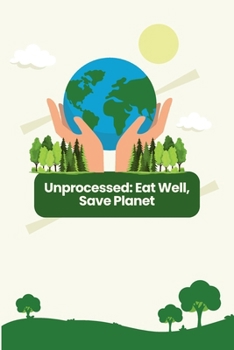Unprocessed: Eat Well, Save Planet
The food systems include food production, processing, packaging, storing, transportation, distribution, advertising, consumption and food waste (1). Our current global food systems have significant negative impact on the environment and increase greenhouse gas emissions (GHGEs) (1). More specifically, they produce 19% to 29% of GHGEs globally (1). GHGEs is one of the major factors of global warming, which rises by about 3% each year (1). It is a serious problem, because global food temperature has increased 2 C since 1750s (2). In addition, food systems are also using about 86% of global fresh water (3), and is responsible for loss of natural habitats, forests and biodiversity (1, 4, 5). To mitigate this problem, there is a need for significant GHGEs cuts in different parts of food chain (2). Our current dietary behaviours have significant impact on our health and the environment. Unhealthy dietary behaviours such as high intake of ultra‐processed foods, animal‐derived products, in particular red meat, sugar‐sweetened beverages and low intake of fruits and vegetables, legumes impose a greater burden on individuals' health and our healthcare system (6). These unhealthy dietary behaviours are linked to development of many dietrelated chronic diseases such as obesity, type 2 diabetes, cardiovascular disease and certain cancers (7). Reduction in animal‐derived foods can lead to significant decrease in GHGEs and reduce the risk of cardiovascular diseases (6). Increased consumption of plant‐based foods as a protein source such as grains, legumes, nuts and fruits and vegetables have beneficial effects on health and environment (8). It is estimated that manufacturing of animal‐derived products produces 50% of total food‐produced GHGEs (2). One kilogram of beef releases about 60 kilograms of GHGEs, compare to peas, which only release 1 kilogram per kilogram (9). Producing feed for animals plays an important role in GHGEs, as a result of utilising fossil fuel for farming, transportation and feed procedures, as well as loss of natural areas due to grazing or feed farming (1). In addition, ruminants (like cows, goats and sheep) consume additional feed for each kilogram of meat, compared to monogastric animals (like pigs and rabbits).
Format:Paperback
Language:English
ISBN:B0D2DRGBZZ
ISBN13:9798869297839
Release Date:April 2024
Publisher:Walter
Length:82 Pages
Weight:0.27 lbs.
Dimensions:0.2" x 6.0" x 9.0"
Customer Reviews
0 rating





